Earning an M.D. is their M.O.
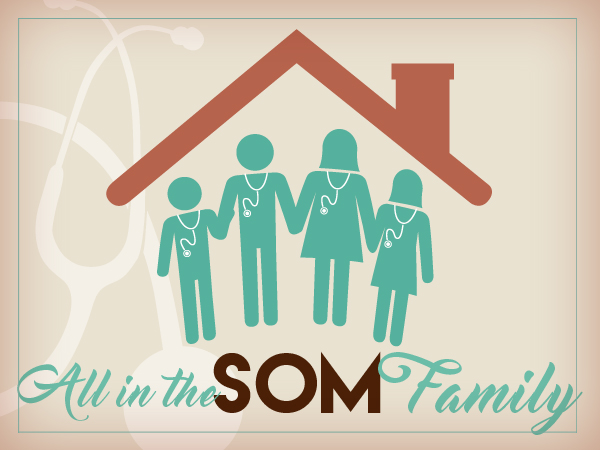
Within a few years, Dr. Felix Adah, a UMMC professor of physical therapy, and his wife Esther Adah, a family support counselor, will have helped put their fourth child through medical school.
In a little more than a year, a pair of medical school alumni, Dr. Thomas Skelton and his wife Dr. Deborah Stepp Skelton, will see their son graduate from the School of Medicine - their third child, and the fifth Skelton, to earn an M.D.
If your goal as a parent is to set your son or daughter on the path of a life well-lived, then you could hardly do better than to consider the examples of these two Medical Center families, whose parents wrote the book - recording it, not on paper, but in the sheer volume of their children's accomplishments and promise.
Together, the Adahs and Skeltons have collected 14 degrees from UMMC or Ole Miss alone, with a 15th piling on in May; at least four more lurking on the horizon.
In each case, the key to success is no great mystery. It's something every family has, but which inspires the members of these two to no end: each other.
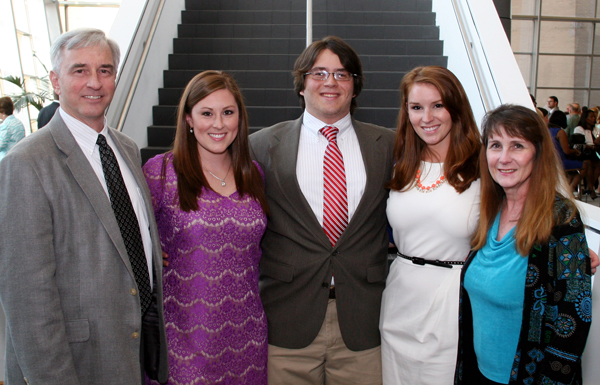
Thomas Skelton Jr., a second-year medical student on his surgical rotation, has a surgeon's direct way of putting things: "This place is just lousy with us," he said.
His father, a professor of medicine in clinical cardiology, offers a gentler description of his family's connection to UMMC: "We're the poster family for the alumni association."
However this relationship is framed, the Medical Center is alive with Skeltons and has been on that track since 1977, when a married couple, Thomas and Deborah Skelton, entered medical school here.
Following Thomas Skelton's 1988 appointment to the faculty, they proceeded to bring up three children in settings inside and around the UMMC campus.
Dr. Deborah Skelton, a private-practice gastroenterologist who sees patients at St. Dominic Hospital in Jackson, said she and her husband never handed down a ruling to their children, career-wise.
"But we did talk about how we like helping people," said Deborah, a Memphis native. "We told them that every day is interesting. It's not always fun, but I'm never bored. I believe the worst thing for every one of the kids is being bored."
They must have known what they were getting into, she said. "I believe Tom and I worked really hard to factor our kids into our professional lives. I scheduled our children around patients and patients around our children so, for instance, I could go to pep rallies at Jackson Academy, where both our daughters were cheerleaders.
"We still missed a few things. If someone was having a heart attack, daddy had to go and save his life. And if someone was bleeding to death from an ulcer, mom had to go and save his life. But I think the kids understood."
Today, the "kids" are Dr. Laura Skelton Smith, School of Medicine class of 2013, a radiology resident in Birmingham, Alabama; Dr. Charlotte Skelton Taylor, class of 2014, a radiology resident at UMMC; and Thomas Skelton Jr., School of Medicine class of 2017.
Although Charlotte agrees that their parents were neutral about their children's careers, "we did get some subtle hints about going to Ole Miss - like Ole Miss scrubs for Christmas presents," she said.
The three Skelton offspring all have undergraduate degrees in physics or biology or biochemistry, or some combination thereof. All of those degrees are from Ole Miss, as are their father's B.S. in physics and B.A. in mathematics (1977), and their mother's B.S. in pharmacy (1976).
Years before they joined the student body at Oxford, the Skelton offspring were mingling with faculty and staff in Jackson.
As children, they watched Disney movies on a conference room TV at the Medical Center's old heart station. They ate chocolate-chip cookies, or "pizzas," from the nearby Pizza Inn while their father took care of people's hearts, taught students to read EKGs, and trained residents and fellows in anesthesia, emergency medicine, cardiology and more.
In the old conference room, the siblings would contemplate the wonders of reflex hammers, Ace bandages and other items pulled from their father's doctor bag.
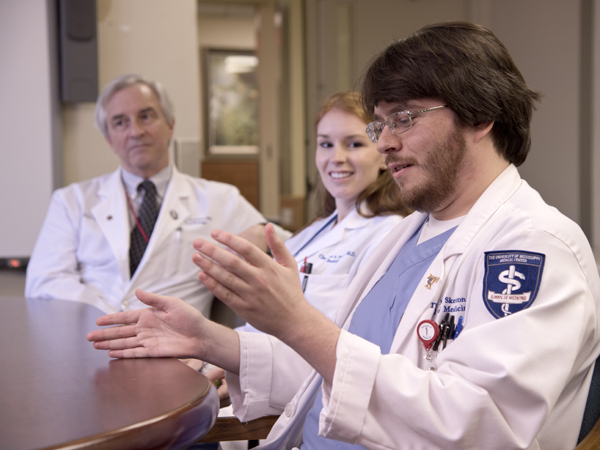
"I used to think there were just three kinds of jobs," said Thomas Jr., whose friends included attorneys' sons. "Doctors, lawyers and fast-food workers."
Obviously, neither Thomas nor his sisters chose careers in plea bargaining or burger flipping.
"I saw how our mom and dad really enjoyed their work and their lifestyles," Laura said. "All three of us kids were pretty good at math and science. I thought medicine was a good idea, and I ended up really liking radiology - the mixture of the diagnostic challenge and technology, and the fact that you are the consultant for other specialties.
"But I never thought my sister would go into radiology, too."
The younger sister, Charlotte, is also an artist; one of her oils will soon hang in a Medical Center conference room. But she began taking career cues from her sister long before Laura entered medical school.
"When Laura did pre-med, I thought, 'What else would I do with my life, too? That sounds good to me,'" Charlotte said. "A lot of it was our parents' example. It was also Laura's."
As for Thomas Jr.: "Well, I thought if Laura and Charlotte are going to be doctors, I have to be one," he said.
Tommy, as his mother calls him, was "smart enough to listen to his sisters," Deborah said. "And the girls take all the credit for Tommy being so smart. They taught him to read when he was really young."
The Skeltons' son was probably still in diapers when he first showed his scientist's chops. "He loved playing the 'Star Wars' CD-ROM game on the computer," his mother said. "One of his first full sentences was, 'Boot it up, mom; boot it up.'"
He is definitely his father's son, as those who work with Thomas Sr. will tell you. "Dr. Skelton is a computer guru," said Connie Watson, division business administrator in cardiology. "He has designed numerous computer programs and even an EKG keyboard to improve workflow."
Father and son are both licensed pilots. Thomas Sr. even thought of becoming an aerospace engineer.
Like his wife, he became, instead, the first physician in his immediate family. Thomas Sr., who grew up in Jackson, met Deborah, a fellow student at Ole Miss, on a blind date while he was studying physics in Oxford. "That's when my dad told me I had the grades to go to medical school," he said.
"It was a lot of work, but once I had selected that goal, it was just a matter of going through it."
His children are like that, he said. "They all have a good work ethic. They all also have good personalities, lots of friends. They enjoy life. But medicine is all about delayed gratification. You have to wait for whatever you might want - getting a career started, having kids. They're all embracing that, I believe."
In at least one sense, the wait is over for his daughters. In December, Charlotte had her first child, a boy, with husband Dr. Jeremy Taylor, a fourth-year internal medicine resident at UMMC. In June of this year, Laura and her husband Will Smith, an accountant, will have their first baby, also a son.
Such coincidences seem almost inevitable in a family whose rhythms - personally and professionally speaking - are so much in sync.
"To see them all in a profession like medicine, I don't worry about them," their father said. "I don't worry about their future.
"They're all so capable, academically and in terms of career management. As far as our influence on them, I'm not sure we did anything on purpose, other than to try and be good parents. They achieved the rest on their own."
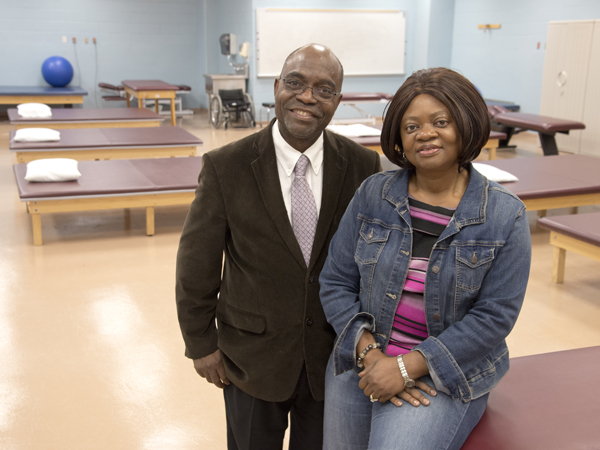
There's a Nigerian proverb that says, "If a child washed his hands he could eat with kings": For those who do the right thing, fortune follows.
Dr. Felix Adah and his wife Esther brought this teaching with them to America about three decades ago. If they had remained in their home country of Nigeria, certainly they would have taught their children to keep their hands clean, as they have here.
The fortune they would reap, however, promised to be greater in their adopted country.
"Whatever difficulties we found here were not different from those at home," Dr. Felix Adah said. "In the American society, you work hard, play by the rules, you survive.
"But, like any immigrant seeking greener pastures, I believed there were better opportunities in America than anywhere else in the world."
The Adahs are playing those opportunities to the hilt.
Dr. Ameze Adah, their oldest child, is an Ole Miss and School of Medicine graduate who's doing her fellowship in pediatric neurology.
Omonuwa Adah, the older of their two sons, worked for five years at the Medical Center as an R.N. in neuro ICU, and is now in his second year of medical school, while participating in the Medical Student Research Program.
Esosa "Sosa" Adah, also an Ole Miss graduate, is a first-year med student and a Mississippi Rural Physician Scholar.
Osasu Adah, their youngest, graduates from Ole Miss in May and plans to enter medical school here.
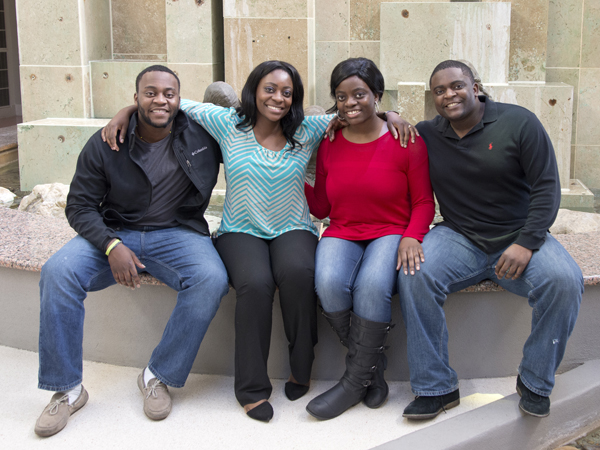
Like their parents, the two oldest children, were born in Nigeria. Years later, on a visit there, Ameze met her future husband, a member of a royal family.
They have also visited the deprived village where their dad grew up, about 10 miles from Benin City.
"It's really humbling," Omonuwa said. "My dad's only way out was school. It was his only way to break out of that."
"If our dad could make it with so little," Ameze said, "no one has an excuse not to make it."
As a native of Nigeria, where English is the official language, Felix Adah faced other obstacles, particularly during the years right before he left for the States. The 1980s were a time of power struggles and uncertainty in the country, with bloodless coups and economic upheavals.
In this climate, Felix Adah managed to get an education, earning degrees at the University of Ife and the University of Ibadan, including one in physical therapy. In 1980, he met Esther in Benin City, where she was brought up.
Esther, who has a master's degree in rehabilitation counseling, now works in the Mississippi Department of Human Services in family support counseling.
"She's the glue in the family," Ameze said. "She'll support you 100 percent, even when she thinks you may be wrong. She's a quiet lady who brings peace in the family."
Not too long after they exchanged phone numbers, Felix and Esther were married. Sometime after their second child was born, around 1987, Felix Adah decided to continue his education and work in Jackson, leaving his "home, family and culture" more than 6,000 miles behind.
Some of the family's relatives had already moved to America. In Mississippi, there is a relatively large and thriving community of Nigerian expatriates.
"They're like my extended family," Omonuwa said.
"Many are very successful," said Ameze. "They are great people to look up to."
Their father became one of them after he was offered an opportunity to join the physical therapy program at UMMC, where he would eventually earn a Ph.D. But it would be a while before he could move his family to Mississippi, around 1990. In the meantime, there were letters and phone calls and the occasional visit to Nigeria.
When they did join him, Ameze and Omonuwa had rarely seen their father over a period of two or three years.
"But we were close immediately," Felix Adah said. At least two things brought, and kept, the family together. "No. 1 is God," he said. "We go to church, it is the foundation of everything we did - life, challenges."
With God, the children were taught, everything came easier, Ameze said. "Our dad likes to quote a scripture: "Faith without works is dead, and works without faith profits only a little."
No. 2: Soccer. "They loved soccer, and we used that as leverage," Felix Adah said. "It was expensive, all the traveling, a lot of investment. But they wanted to do it. So we told them, "If you want to do this, you must make good grades. And show good character, or I'll pull you out of soccer."
"They did not want to hear that."
All four children played on travel teams and/or for public schools in Clinton, the place where they grew up. Felix Adah even coached his two sons. "That was the biggest area that bonded all of us," he said. "They learned how to win, how to lose. To recover and learn. They learned to compete, to be champions."
The children excelled in soccer, and in class.
"School was always first in our family," Sosa said. In fact, when his then-teenage brother asked if he could get a job, Felix Adah demurred.
"He preferred that I study and work on my grades," Omonuwa said.
Even now as Omonuwa and Sosa room together as medical students, they will sometimes find their parents cleaning their apartment and doing the grocery shopping for them, hoping to give them more time for their studies.
Years earlier, whenever their studies presented a problem at Clinton High School, the parents stepped in, buying the right books, arranging for their children to take prep courses or seminars.
"We did not left them drift," Felix Adah said.
"We discuss everything with them," said Esther Adah. "The children were never out of their sight."
"We knew where they were," their dad said. "We sacrificed, and they wanted to pay us back by being good children."
In middle school, Sosa found a way to pay back his parents materially as well. Bringing home a pile of awards one day, he said, "Daddy, I worked all year to give these to you."
But the parents had no idea that all that hard work and those good grades would lead all of their children to medical school.
"We did teach them to do things that will help mankind," said their dad. "Engineering, physical therapy - these are all from the same mind. Actually, I wanted Omonuwa to study law, because he writes very well. But after his nursing training, he preferred to stay in the medical line.
"When they all chose to study medicine, I asked them, 'Are you ready to take this extra challenge? This is a lifelong commitment.'"
Omonuwa, who earned his B.S. in nursing from Mississippi College in 2009, is the only one who left another career for medicine. After his stint as a nurse, he decided to take the courses he needed to get into medical school, following his older sister's example.
"There is a saying," Felix Adah said, "that if the oldest child is good and successful, the rest are likely to follow."
The three youngest children all say their paths are smoother because of the ones who traveled them first.
"My life has been a lot easier because my brother has been through it before me," Sosa said. "I've had resources the others don't have."
"I can say the same thing, because my sister went through it before me," Omonuwa said of Ameze.
As for Osasu, the youngest, her siblings agreed she will have the easiest time: "She's the genius," they said. "The rest of us have to work hard."
They said this, not with sarcasm or resentment, but with respect.
"We're not competitive with each other," Omonuwa said. "I'd like to see them do better than me. I take pride in their success. We're all Adahs."


